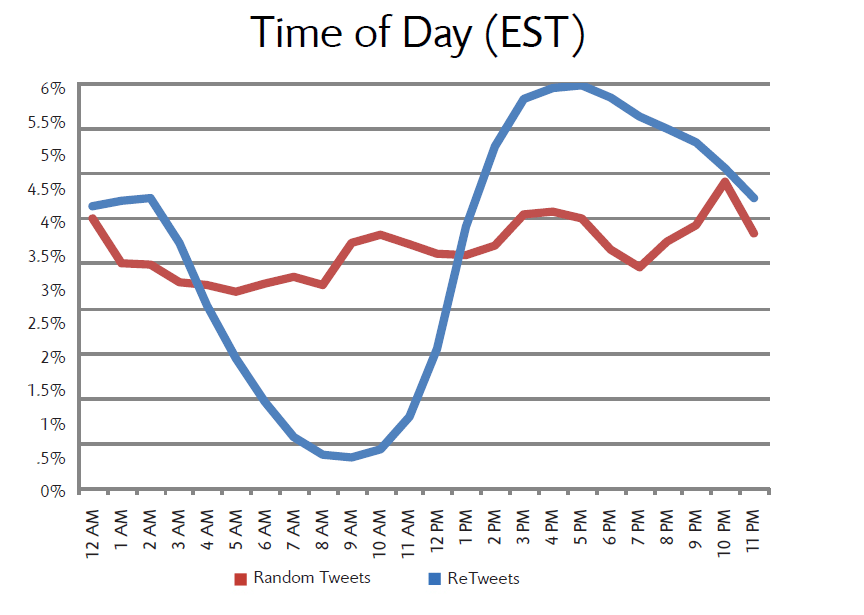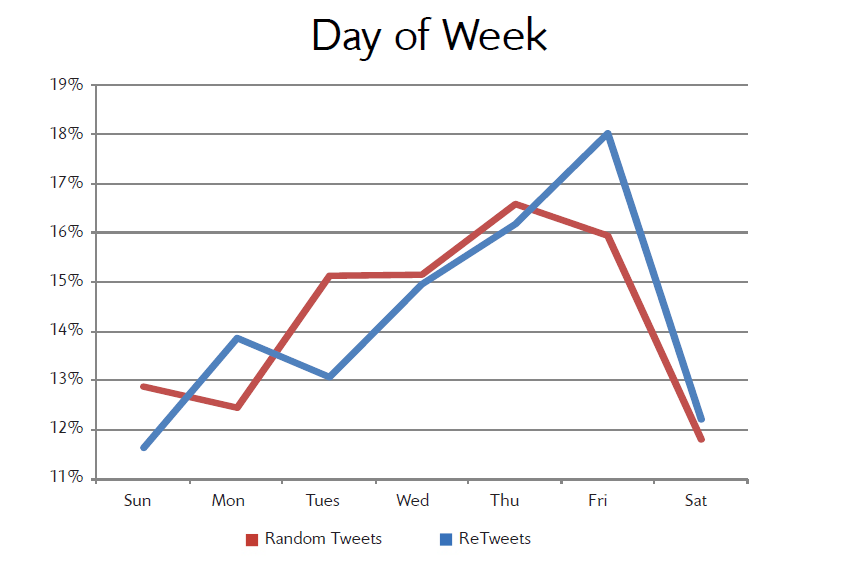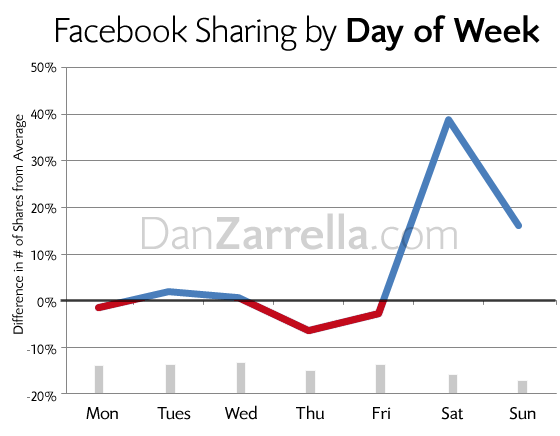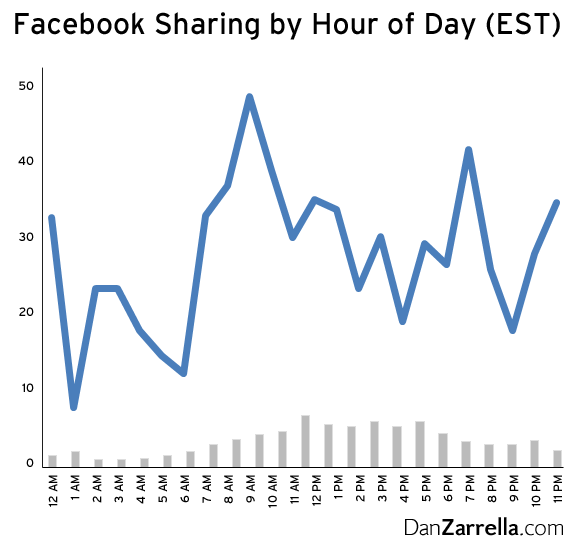This guest post is by HubSpot’s social media scientist, Dan Zarrella.
Of all the data analysis that I’ve done, day-of-week and time-of-day data has been consistently the most popular. So in preparation for my upcoming webinar, titled Science of Blogging, I decided to combine all of my existing data on timing with my new research into one master post on the subject.
The first time I looked at blog post timing was when I was analyzing retweets. I found that retweets exhibit a strong diurnal pattern, in that they’re more common during the day and less so at night. I noticed that retweet activity tended to peak around 4pm EST, suggesting that this might be the best time to tweet a blog post for maximum potential retweet reach.
When I looked at retweet activity over the days of the week, I saw that they peaked later in the work week, specifically on Friday.
Since I first published this graph, the most frequently cited piece of this research has been the idea that Friday at 4pm is the most retweetable time of the week. While your niche maybe different, this data was based on analysis of nearly 100 million retweets, so in aggregate, Friday at 4pm is indeed the most retweetable time of the week.
Moving on from retweets, I started studying Facebook sharing and discovered some things that surprised me about timing there, too.
First, while major news sites and blogs publish articles during the work week, articles that are published on Saturday and Sunday tend to be shared on Facebook more than those published during the week. Perhaps one reason for this is that (as Wired reported), more than 50% of American companies block Facebook at work.
Next, I looked at the effect that the time articles were published had on the number of times they were shared on Facebook. I found that while there is a fair amount of variation, articles published in the morning, around 9a.m. EST, tended to be shared more on Facebook than articles published at other times of the day.
Looking back at these four data points, it may seem that they’re contradictory, but thinking through them a bit more, we can see that they is not necessarily so. Both day-of-week charts tell us that we should experiment with publishing articles later in the week—on Friday and Saturday specifically.
And by publishing posts early in the day, but tweeting them later in the afternoon, we can stimulate both Facebook shares and retweets.
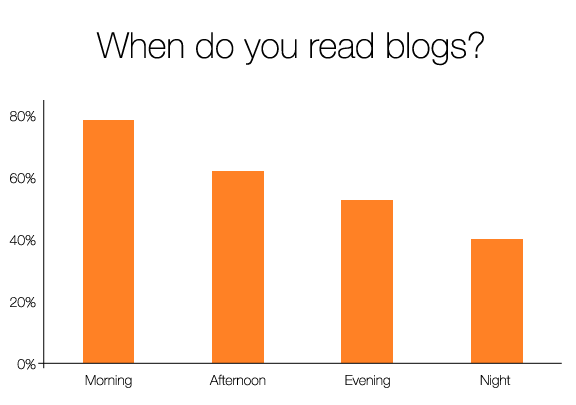 I recently did a survey of over 1,400 blog readers and I asked them what time-of-day they read blogs. Morning was the most popular, followed in decreasing popularity by the rest of the day. Most respondents reported reading blogs at more than one time, so this piece of data reinforces my suggestion to publish early in the morning.
I recently did a survey of over 1,400 blog readers and I asked them what time-of-day they read blogs. Morning was the most popular, followed in decreasing popularity by the rest of the day. Most respondents reported reading blogs at more than one time, so this piece of data reinforces my suggestion to publish early in the morning.
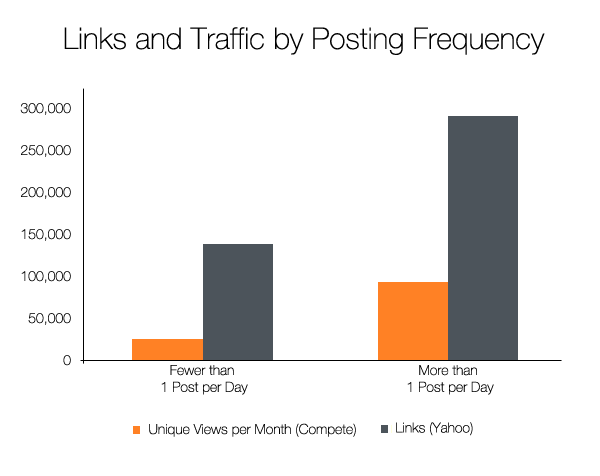 The best timing advice, however, may actually be around frequency. Last week, I analyzed 1000 of the most popular blogs on the web, according to Technorati. I compared their posting frequency with the number of incoming links and visitors they had attracted (according to Yahoo and Compete).
The best timing advice, however, may actually be around frequency. Last week, I analyzed 1000 of the most popular blogs on the web, according to Technorati. I compared their posting frequency with the number of incoming links and visitors they had attracted (according to Yahoo and Compete).
I found that among very popular blogs, publishing multiple times per day led to a huge increase in a blog’s success. This tells us that rather than focusing one perfect day or time, we should aim to publish at many times, and on many days.
Have you experimented with post timing and tweeting? What has your experience shown about the best times of day or week to reach your readers?
Dan Zarrella is HubSpot’s social media scientist. This post contains data from his upcoming webinar The Science of Blogging, taking place on December 9th.
Post from: ProBlogger Blog Tips
When’s the Best Time to Publish Blog Posts?
